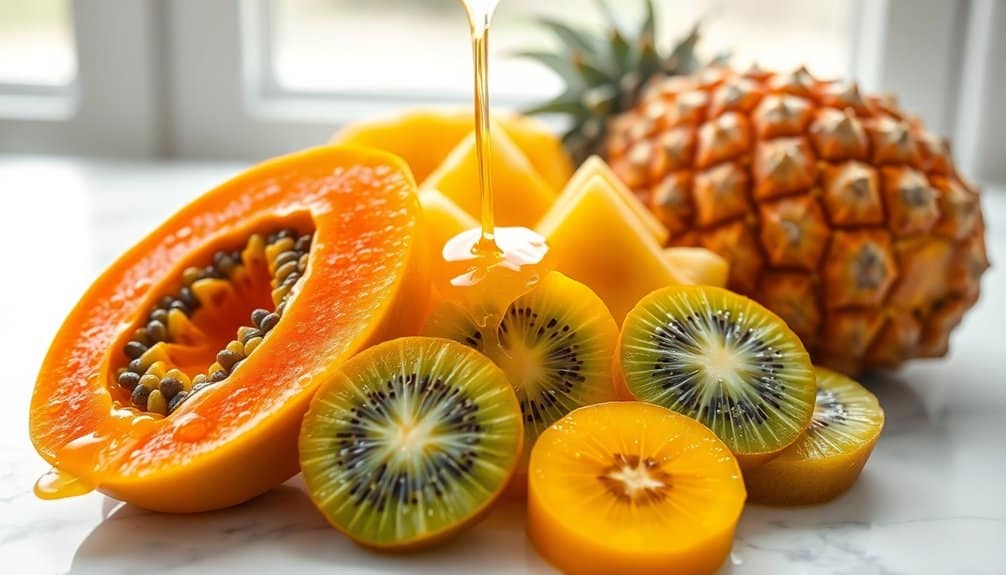Have you noticed how smooth your skin feels after enjoying a fresh pineapple? This delightful fruit is more than just a treat; it showcases nature’s gentle ability to exfoliate. The natural enzymes found in fruits provide a softer alternative to the abrasive scrubs and potent chemicals often used in skincare.
While you rest, these gentle agents quietly work to dissolve away dead skin cells, revealing a brighter and fresher complexion.
These enzymes can indeed transform your skincare routine. It’s essential, however, to choose the right fruit enzymes tailored to your skin’s unique needs. Each fruit offers different acids and benefits, so understanding how your skin reacts to them is key to achieving the desired results.
By exploring various options, you can discover which ones harmonize best with your natural beauty.
Integrating these natural solutions can lead to remarkable clarity and toning over time. As you embark on this journey of skin enhancement, embrace the wisdom of nature.
It offers a path towards nurturing your skin while honoring your own wellness.
Table of Contents
Toggle
When your skin appears lackluster or feels uneven, consider the subtle charm of natural enzymes. These gentle exfoliators come from fruits that might already grace your table, offering you a refreshing alternative to abrasive scrubs and harsh chemicals that can irritate delicate skin.
Picture enzymes as diligent artisans dissolving the bonds that keep dull, dead skin cells clinging to your face. They break down keratin with precision, gently unveiling the fresher, smoother complexion beneath without disrupting your skin’s natural barrier or altering its pH balance.
Fruit contains these remarkable enzymes in delightful forms. Take papaya, for instance, enriched with papain, which not only exfoliates but also provides antioxidant benefits, safeguarding your skin against free radicals. Pineapple’s bromelain reduces inflammation, helping clear away lifeless cells. Enzymes can be found in kiwi, pumpkin, mango, and even blueberries, each contributing to a brighter, revitalized appearance.
While physical scrubs may cause friction and potential damage, enzymatic exfoliation relies on a chemical process that is much milder. No scrubbing is necessary; the enzymes work to lift away dead skin without risking irritation or redness, which can often follow traditional methods. Unlike physical scrubs that can create microtears, enzyme cleansers provide effective exfoliation without causing damage to the skin’s delicate surface.
The advantages of these enzymes extend beyond mere exfoliation. As dull skins cells fade, you will likely notice a brighter complexion and fewer uneven tones. For those with sensitive skin or redness, enzymes can soothe rather than exacerbate irritation. They also work effectively to unclog pores, making them a wise choice for those prone to breakouts.
Regular use of enzyme treatments can enhance collagen production, promoting firmness and hydration. Many find that their skin feels soft and moisturized following an application. Gentle enough for sensitive skin, these enzyme treatments don’t require the strength of harsher alternatives.
You may choose to incorporate enzyme exfoliants into your regimen one to three times weekly, depending on your skin’s unique needs. Available in a variety of forms such as cleansers, masks, and serums, they offer flexibility in application. A mindful approach is best, as even gentle exfoliation should be practiced with care.
In addition to their exfoliating properties, many fruit enzymes carry antioxidant benefits that protect your skin from environmental stressors like pollution and UV exposure. This dual action of exfoliation and defense means you’re not just clearing away the old but also fortifying against future damage.
Natural enzymes allow for a straightforward and soothing approach to skincare, enabling you to attain clear, radiant skin by embracing the gentle touch of nature.
Natural enzymes, sourced from fruits such as papaya, pineapple, and kiwi, gently break down the proteins in dead skin cells. Unlike harsh scrubs or chemical peels, these enzymes specifically target keratin found in the outer layers of your skin. They enhance the natural exfoliation process, dissolving the bonds that hold dead cells, which reveals smoother, more radiant skin without harming the healthy layers beneath.
Enzyme products are generally safe for sensitive skin. Since they focus on dead skin cells and operate at a gentle pH, they tend to cause less irritation compared to alpha or beta hydroxy acids. They work to preserve the skin’s natural moisture barrier and typically do not induce the stinging or redness associated with stronger chemical exfoliants. It is wise to conduct a patch test when incorporating new products into your routine.
Many find benefit in using enzyme products 2-3 times weekly for ongoing skin clarity. Depending on individual skin type and product concentration, frequency may vary. Beginning with once a week and gradually increasing as your skin adjusts is a prudent approach. Avoid over-exfoliation, as this can compromise the skin barrier; instead, focus on moderate and steady use.
Typically, enzyme-based skincare is considered safe during pregnancy. They are topical in nature and do not penetrate deeply. Unlike retinoids or certain chemical peels, which are often advised against during this period, natural fruit enzymes provide a gentle alternative to support skin health. Always consult your healthcare provider before beginning any new regimen during this time.
While enzyme products may not deliver the dramatic immediate effects of chemical peels, they offer a gentler yet effective form of exfoliation. Chemical peels can yield noticeable results but often carry a risk of irritation and downtime. Enzymes nurture consistent improvements in skin texture and clarity, making them suitable, especially for those with more sensitive skin.
Different enzymes cater to varied skin needs. Papain from papaya is renowned for gentle exfoliation and brightening, while bromelain from pineapple promotes cell turnover. Pumpkin enzymes add antioxidant benefits, and actinidin from kiwi aids protein breakdown for renewal. Generally, papain and bromelain serve as versatile options for achieving clearer skin.
Indeed, enzymes assist in addressing hyperpigmentation by facilitating cell turnover and efficiently removing pigmented dead skin cells. Regular use encourages the unveiling of fresh skin beneath, gradually lessening the visibility of dark spots and sun damage. This approach may take time, but it minimizes the risks of post-inflammatory hyperpigmentation often seen with more aggressive treatments.
Most individuals observe a notable improvement in skin texture and brightness within 2-4 weeks of consistent enzyme application. Initial changes may include a smoother surface and reduced dullness, while longer-lasting benefits, like improved tone and diminished hyperpigmentation, usually appear over a span of 6-12 weeks. Adhering to a regular routine is essential for optimal results.
Enzymes generally complement hydrating ingredients and antioxidants beautifully; however, it is prudent to exercise caution with other exfoliants. Using enzyme products alongside retinoids or AHA and BHA products can lead to excessive exfoliation. Gentle actives such as hyaluronic acid, vitamin C, and niacinamide harmonize well with enzyme treatments. It is wise to introduce new combinations gradually.
Enzyme masks often feature higher concentrations for a more intensive treatment, meant to be used weekly or bi-weekly for around 10-15 minutes. In contrast, daily enzyme cleansers are formulated with lower concentrations for regular use without the risk of over-exfoliation. Masks yield deeper exfoliation and more pronounced effects, while enzyme cleansers provide gentle, daily maintenance for skin clarity and texture. Papaya enzymes are particularly effective at neutralizing body odor by removing the buildup of dead skin cells that can harbor bacteria and sweat.

Embracing enzyme products for your skincare can be a delightful journey, but it’s essential to navigate it with care. Understanding the nuances of these natural exfoliants will lead you to beautiful results, without unwelcome surprises.
To begin, introduce enzyme products into your routine gradually. Start by using them once or twice a week. This gentle approach allows your skin to acclimate, minimizing the risk of irritation while enabling you to observe how your skin reacts to these potent ingredients.
Before diving into new treatments, conduct a patch test. Select a discreet area of your skin to apply a small amount of the product. This precaution is especially wise for those with sensitive skin, as it helps to prevent adverse reactions. While topical enzyme application is generally considered safe, some individuals may experience allergic reactions when these products are applied to the skin.
Staying mindful of cleanliness plays a crucial role in your application routine. Once you’ve applied the enzyme treatment, ensure you wash your hands thoroughly. Avoid the temptation to touch your face with fingers that may still carry product residue; this simple step helps protect sensitive areas like your eyes and mouth from irritation.
Certain circumstances necessitate caution as well. If you are pregnant or nursing, it’s prudent to consult with a medical professional before using enzyme products. Ensuring safety during this time is paramount.